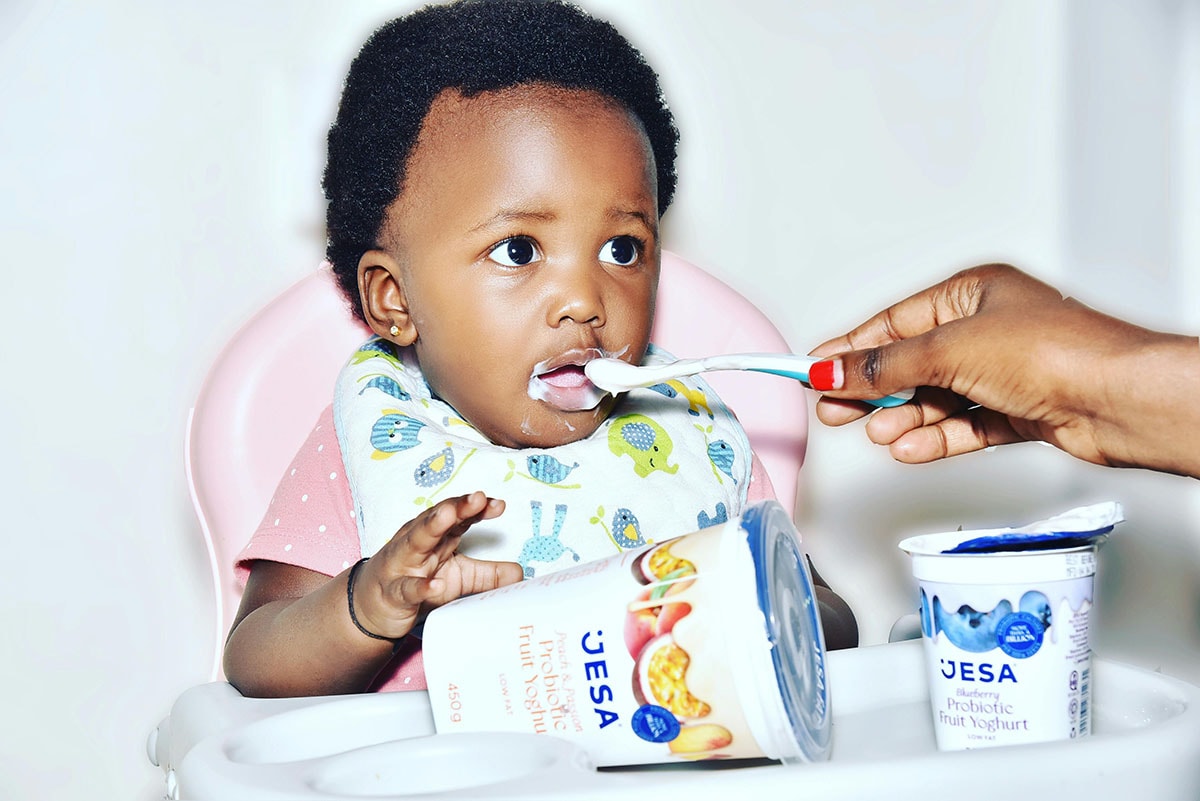The benefits of infant probiotics range in health advantages from strengthening immune systems to alleviating issues like colic and constipation. Newborn probiotics play a crucial role in establishing and maintaining a healthy balance of gut bacteria, known as the microbiome. By fostering a balanced gut microbiome early in life, and adding probiotics you will contribute to the foundation of a resilient and healthy future for the growing child.
These tiny microorganisms, often associated with gut health, play a pivotal role in maintaining a delicate balance within your baby’s system. In this journey of parenting, understanding the benefits of infant probiotics can be a game-changer. Let’s delve into the world of these friendly bacteria and explore how they can contribute to your baby’s overall health.
Understanding that Probiotics are Beneficial for Gut Health
Probiotics are tiny living organisms, mostly healthy bacteria and yeast, that are beneficial for our health, especially in our digestive system. They’re like friendly helpers that work to keep our gut in balance and support our overall well-being. The two main types of bacteria found in probiotics are Bifidobacterium and Lactobacillus.

These microorganisms are often referred to as “good” or “friendly” bacteria because they help maintain a healthy environment in our digestive tract. There isn’t just one type of probiotic – probiotics come in many strains, each with its unique benefits. The most common ones include Lactobacillus acidophilus and Bifidobacterium bifidum. Together, these probiotics contribute to a diverse and thriving community of microorganisms in our gut, playing a crucial role in supporting our digestive and immune systems.
Probiotics in Baby
Probiotics are living microorganisms that provide health benefits when consumed in adequate amounts. They come in various strains, with one particular strain gaining attention for infants – Bifidobacterium infantis, also known as B. infantis.
Natural Food Sources for Infant Probiotics
While different types of probiotics are available, nature provides us with rich sources. Foods like yogurt, kefir, and fermented vegetables can introduce these beneficial microorganisms to your baby’s diet deliciously and naturally. While probiotic include natural foods, supplements can be a convenient option, too.
Yogurt: A Tasty Treat
Yogurt is a superstar when it comes to natural probiotics. Opt for plain, unsweetened yogurt with live and active cultures. You can introduce small spoonfuls to your baby’s diet, gradually increasing the amount as they become accustomed to this delightful treat. Consider mixing it with pureed fruits for added flavor and nutrition.

Pro Tip: If you’re feeling adventurous, try making your yogurt at home. It’s a surprisingly simple process that allows you to control the ingredients and ensure maximum freshness. All you need is milk and a yogurt starter culture. Heat the milk, add the culture, and let the magic happen. Your homemade yogurt will be brimming with loads of benefits for babies and children.
Kefir: A Liquid Boost
Kefir, a fermented milk drink, is another fantastic source of probiotics. Its slightly tangy taste might be a delightful surprise for your baby’s taste buds. You can introduce kefir gradually by diluting it with water or mixing it into smoothies. As with yogurt, choosing plain kefir without added sugars ensures your baby gets the full probiotic benefit.
Pro Tip: You can experiment with making kefir at home, too. All you need is kefir grains and milk. The grains ferment the milk, creating a probiotic-rich drink. It’s a fun and rewarding process that allows you to tailor the kefir to your baby’s preferences.
Fermented Vegetables: DIY Gut-Healthy Goodness
Introducing fermented vegetables into your baby’s diet might sound unconventional, but it’s a flavorful way to boost their probiotic intake. Examples include sauerkraut and kimchi, which are rich in beneficial bacteria. Start with small portions, finely chopped or pureed for younger babies, and observe their response.
Pro Tip: Making your fermented vegetables at home is surprisingly easy. For sauerkraut, all you need is cabbage and salt. Shred the cabbage, mix it with salt, and pack it into a jar. The natural fermentation process begins, creating a probiotic-rich condiment for your baby’s meals. It’s a creative and cost-effective way to enhance their diet with gut-healthy goodness.
Probiotics and Nutrition
By exploring these natural sources of probiotics, you not only offer a diverse range of flavors to your baby but also provide them with a nutritional boost in a wholesome and homemade way. So, whether you’re spooning yogurt, sipping kefir, or experimenting with your fermented creations, enjoy the journey of nourishing your baby’s developing palate and gut health.

Benefits of Probiotics for Babies
Trying probiotics for babies can offer numerous benefits for their overall health and well-being. According to the World Health Organization (WHO), introducing probiotics in infancy can help establish a balanced gut microbiota, essential for a strong immune system and optimal nutrient absorption.
The benefits include alleviating common digestive issues such as colic, reflux, and constipation, and promoting a more comfortable feeding experience for both the baby and parents. It is generally recommended to start introducing probiotics to babies, especially formula-fed infants, in consultation with pediatricians, typically around the age of one month, as their digestive systems are still developing, and probiotics can contribute to a healthier gut flora.
Benefits of Probiotics for Infants Includes Improved Digestive Health
Probiotics for infants have become a popular area in pediatric health and nutrition. But you might be wondering what exactly are these benefits of infant probiotics. Primarily, the microscopic wonders supply a key role in bolstering your baby’s immune system. They help to prevent and treat conditions such as diarrhea and colic, constipation, and acid reflux which are common among newborns, babies, and toddlers.
Infant probiotics work at maintaining a healthy gut – a critical aspect in shaping your child’s immune response. Having a diverse colony of good bacteria ensures better absorption of nutrients from food which indirectly contributes to overall growth and development during those crucial early years!
Probiotic Supplements Can Balance Gut Microbiota
Imagine your baby’s gut as a bustling city, with probiotics as the friendly residents ensuring harmony. Probiotics, especially B. infantis, help blance the gut microbiota, promoting a healthy environment. The gut microbiota, a diverse community of microorganisms residing in the digestive tract, plays a pivotal role in supporting the immune system, digesting nutrients, and protecting against harmful pathogens

B. infantis is a beneficial bacterium naturally found in the intestines of breastfed infants. It specializes in breaking down and utilizing components of breast milk, fostering a symbiotic relationship with the baby’s developing digestive system. Taking probiotics not only aids in the digestion of nutrients but also helps prevent the colonization of harmful bacteria.
The use of B. infantis as a probiotic supplement has gained attention for its potential to positively impact the gut microbiota composition in formula-fed infants. Research suggests that incorporating B. infantis into a baby’s diet can contribute to the establishment of a diverse and balanced microbial community, resembling that of breastfed infants. This balance is essential for mitigating the risk of gastrointestinal issues and supporting optimal nutrient absorption.
Probiotics in Infants Can Alleviate Digestive Issues
Research has found that probiotics have shown promise in alleviating common digestive issues like gas, reflux, and colic. Their presence helps smooth out the sometimes bumpy journey of early digestion. Infants, especially those who are formula-fed, may experience digestive challenges as their delicate digestive systems are still developing. Probiotics, which are beneficial bacteria, work to restore and maintain a harmonious microbial environment in the digestive tract.
One way in which probiotics alleviate digestive issues is by aiding in the breakdown of complex sugars and promoting the absorption of essential nutrients. This assists in easing the digestive process and reducing discomfort caused by gas or bloating. Probiotics can help regulate bowel movements.
Some Types of Probiotics Strengthen Immune System.
No one likes seeing their child sick with any kind of illness, and probiotics are such a great immune-system-booster that they have been linked to reducing the number of childhood illnesses such as colds, flu, strep throat, and stomach bugs! Now who wouldn’t want to sign up for that benefit immediately?
Probiotics are generally helpful by strengthening the lining of the digestive tract by not allowing bad bacteria to pass through and enter the bloodstream. Think of it as armor for your child’s immune system. If your little one does get sick, they will likely experience less severe symptoms because of probiotics.
Think of probiotics as the superheroes fortifying your baby’s defense system. They play a crucial role in enhancing the immune response, making your little one less susceptible to infections and illnesses. By fostering a robust immune system, probiotics act as shields against common childhood infections. It’s like giving your baby an extra layer of protection in their early encounters with the world.
Additional Benefits from Probiotics for Infants Include Allergy Prevention, Colic Relief, and More
Allergy Prevention
Probiotics have shown promise in mitigating allergies in babies by positively influencing the development of their immune systems and promoting a balanced gut microbiota. Allergies often stem from an imbalance in the immune response, and the gut plays a crucial role in regulating immune function. Introducing probiotics, particularly strains like Lactobacillus and Bifidobacterium, can modulate the immune system’s reactivity, potentially reducing the risk of allergic reactions.

Research suggests that babies who were given probiotics during infancy are less likely to develop allergic conditions such as eczema and food allergies. By fostering a diverse and resilient gut microbiota, probiotics help train the immune system to distinguish between harmless and harmful substances, thus lowering the likelihood of allergic sensitivities.
Nutrient Absorption
Probiotics aren’t just about gut health; they also play a role in nutrient absorption. A well-balanced gut flora ensures that your baby can absorb essential nutrients effectively, promoting overall growth and development. In other words, with the help of probiotics, your baby’s tiny body becomes a sponge, absorbing the maximum goodness from every spoonful of nourishment. It’s like giving them a nutritional boost with every meal.
Colic Relief
Colic can be a challenging phase for both parents and babies. Probiotics, particularly B. infantis, have shown promise in easing colic symptoms, providing much-needed relief, and improving overall comfort. Happy baby, happy parents. Probiotics contribute to your baby’s comfort by addressing colic and other discomforts, allowing for more peaceful moments during those early months.
Regulation of Bowel Movements
Probiotics can prevent constipation. Navigating the delicate balance of your baby’s digestive system involves ensuring regular bowel movements. Probiotics contribute to this balance, promoting a happy, comfortable tummy. Imagine your baby’s digestive rhythm as a gentle dance. Probiotics, with their harmonizing effect on gut health, help maintain this rhythm, ensuring that bowel movements are regular and consistent.
Brain Development
The connection between gut health and brain function is intriguing. There is evidence that probiotics can help by positively influencing the gut-brain axis, may contribute to optimal cognitive development in your baby. It’s like laying a strong foundation for future learning adventures. Consider probiotics as emotional architects for your little one. The gut-brain axis not only influences cognitive development but also plays a role in emotional well-being. Probiotics may contribute to a happy, content baby by fostering a healthy gut-brain connection.
Weight Management
While it might sound surprising, there’s a link between probiotics and metabolism. Early exposure to these beneficial bacteria may have a positive impact on your baby’s metabolism, potentially playing a role in preventing childhood obesity. Probiotics can also act as a preventive measure against future health challenges and can be an ally in maintaining a healthy weight trajectory for your little one.
Dental Health
Probiotics may help beyond the gut, reaching the realm of dental health, too. By promoting a balanced oral microbiota, they contribute to healthy gums and teeth, laying the foundation for a lifetime of radiant smiles. Just as a strong foundation supports a sturdy structure, a healthy oral microbiota established with the help of probiotics may reduce the risk of dental issues in the long run. It’s like investing in your baby’s future oral health.
How to Incorporate Baby Probiotics


Breastfeeding is not just a bonding experience; it’s also a natural source of probiotics for your baby. Your breast milk is a powerhouse of nutrients, including beneficial bacteria that contribute to your baby’s gut health. The close connection between the digestive system of breastfed babies and probiotics creates a symbiotic relationship, nurturing your baby from the inside out.
If you’re considering supplements, choosing the right probiotic can make a significant difference. Opt for formulations specifically designed for infants, with a focus on strains like Bifidobacterium infantis. Probiotic drops, carefully measured for your baby’s age, offer a convenient way to introduce these beneficial microorganisms.
Diversify your baby’s diet with probiotic-rich foods. Yogurt, with live and active cultures, is a tasty option. If your baby is ready for solids, consider introducing fermented vegetables like sauerkraut or kimchi in small, age-appropriate portions. These culinary adventures not only add variety to your baby’s palate but also contribute to a flourishing gut microbiota. Consult your pediatrician, when considering the right strains, and monitoring your baby’s response ensures a tailored and effective approach.
Precautions and Considerations
Embarking on the probiotic journey for your baby comes with responsibilities. Here are crucial precautions and considerations to ensure a safe and effective experience when you administer probiotics to your infant.
Consulting with a Pediatrician
Your pediatrician is your trusted guide in this journey. Before introducing probiotics, consult with your healthcare provider. They can provide personalized advice based on your baby’s health, ensuring that probiotics align with their specific needs and any potential health considerations.
Choosing the Right Probiotic Strains
Not all probiotics are created equal. Probiotics are not regulated, so selecting the right strain is key. Different strains offer distinct benefits, so tailor your choice to your baby’s unique requirements. Your pediatrician can offer guidance on the most suitable strains for your little one.

Monitoring for Any Adverse Reactions
As with any new addition to your baby’s diet, keen observation is crucial. Monitor your baby for any potential adverse reactions, such as changes in bowel habits or unusual fussiness. This proactive approach allows you to adjust probiotic intake as needed, ensuring a positive experience for your baby.
Incorporating probiotics into your baby’s diet is not a one-size-fits-all approach. Whether through breastfeeding, carefully selected supplements, or introducing probiotic-rich foods, the key lies in a balanced and personalized strategy. Remember, consulting with your pediatrician ensures that the probiotics are safe and the choices you make align with your baby’s unique needs.
As you venture into the world of parenting, consider probiotics as your allies, working silently to support your baby’s growth and development. By fostering a harmonious gut environment, probiotics contribute to a resilient immune system, a happy tummy, and a thriving little one.
So, here’s to the joy of parenthood, the wonders of a baby’s first smile, and the supportive role of probiotics in this beautiful whole journey. Embrace the balance, seek guidance when needed, and revel in the delightful moments of watching your baby grow, nourished by the power of probiotics.
FAQs
Q: Are baby probiotics safe?
A: Yes, giving probiotics to infants is safe. However, it’s always best to consult your pediatrician before introducing any new supplements to your baby’s diet, as certain health conditions may not benefit from probiotics.
Q: Are baby probiotics good for newborns when mixed with baby formula or infant formula?
A: Probiotics can be mixed safely with both baby formula and infant formula. Several infant formulas even contain probiotics as a part of their ingredients. It’s known that probiotics help in maintaining a healthy balance of good and bad bacteria, which is crucial to a newborn’s digestive system.
Q: How can probiotics help the digestive system of my baby?
A: Good bacteria found in probiotics can aid the digestive system by breaking down food and absorbing nutrients, which can promote a healthy immune system. They also help infants develop these vital microorganisms.
Q: Can probiotics be given to a baby who is less than 4 months old?
A: Probiotics have become a vital part of baby wellness, and can be given even when the baby is less than 4 months old. However, the dosage should always be checked with a doctor.
Q: Will the benefits of infant probiotics have a positive impact on a baby’s gut health?
A: Yes, research on the benefits of probiotics for infants has found that treating healthy babies contributes to gut health by balancing the levels of bacteria in the intestines. This aids in the digestive process and enhances the immune system. Adverse reactions to probiotics are rare.
Q: Are probiotics contained in breastfed infant diets naturally?
A: Yes, breast milk naturally contains probiotics. These live bacteria get transferred from the mom to the infant during breastfeeding which plays a crucial role in establishing a healthy gut. Additional use of probiotics may be necessary if the baby was born via a C-section, if the baby was born prematurely, or if the mother had to take antibiotics during pregnancy.
Q: How often should you give your baby probiotics?
A: The frequency typically depends on the specific brand’s instructions. However, a daily probiotic is usually recommended for maintaining a steadiness of good bacteria in the baby’s gut. Always consult with your pediatrician for precise guidance.
Q: Can I still use probiotics for my baby if they are on antibiotics?
A: Yes. Antibiotics can upset the balance of bacteria in the gut by killing both good and bad bacteria. Using probiotics can help restore that balance.
Q: Do all infant formulas contain probiotics?
A: Not all infant formulas contain probiotics. If you want to ensure your baby is getting these beneficial bacteria and considering the formula contains these live organisms, you should look for formulas specifically labeled as containing probiotics. Remember, everything you need to know should be listed on the product label.
You might also be interested in…
CONNECT WITH DAILY MOM
💖 NEWSLETTER: DAILY READS IN YOUR INBOX 💖
Sign up to receive our picks for the best things to do, see, and buy so you can relax and focus on more important tasks! Let us help you be the best version of yourself you can be!
BE SOCIAL WITH US
📌 LOVE IT? PIN IT!📌













































At what age can/should you start a probiotic?
Hi Amanda! Great question! Most children’s probiotics have a recommended age noted on the package – for example, the RAW kids mentioned in this post can be started at 3 months old. We recommend checking the package of your chosen brand, and as always, check with your pediatrician for additional guidance.
I use the Baby Jarro-Doph and it is great! I put it in my pumped breastmilk.
I started LO on Jarrows, how long should I give it to see if it is working? He has constipation issues and I’m hoping the probiotics will help. It’s been 2 weeks so far, and nothing’s changed. I started him on 1/16 tsp first week, then 1/8 next week, now he’s on 1/4. Any information would be appreciated.